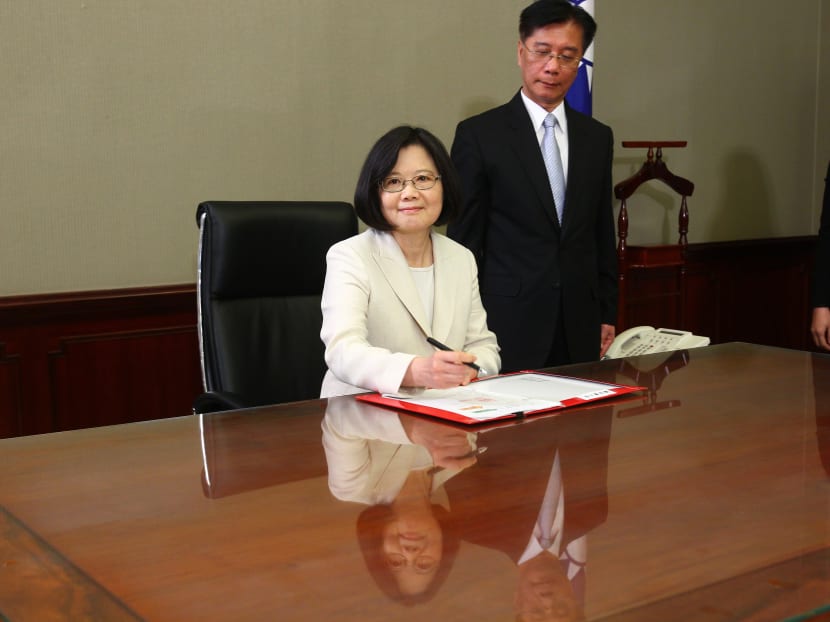New Taiwan govt drops charges against anti-China protesters
TAIPEI — Taiwan’s new government has dropped charges against 126 people who occupied a main administrative building during a protest against a trade pact with China two years ago.

Taiwan's President Tsai Ing-wen signs her first document at her new desk following the inauguration ceremony at the Presidential Office in Taipei, Taiwan May 20, 2016. Taiwan inaugurated Tsai as its first female president on Friday, returning the pro-independence Democratic Progressive Party to power amid new concerns over increasingly fractious relations with Beijing and a flagging economy. Photo: Taipei Photojournalists Association/Pool Photo via AP
TAIPEI — Taiwan’s new government has dropped charges against 126 people who occupied a main administrative building during a protest against a trade pact with China two years ago.
The decision was made on Friday (May 20), immediately after Taiwan’s President, Tsai Ing-wen, was sworn into office, and announced on Monday (May 23) by Premier Lin Chuan.
The protesters were charged with counts related to the takeover of Taiwan’s Cabinet building for several hours on March 23 and 24, 2014. The police used clubs and water cannons to clear the building, leaving nearly 200 people injured. That act was an escalation of the occupation of Taiwan’s legislature, which lasted 23 days and succeeded in blocking a trade Bill.
Dr Tsai won the presidency by a large margin in January, in part because of concerns about the pursuit of close ties with China by her predecessor, Ma Ying-jeou of the Kuomintang (KMT).
Her Democratic Progressive Party (DPP) was supportive of the protesters, known collectively as the Sunflower Movement, and a float at her inauguration on Friday was adorned with sunflowers.
“The Sunflower Movement was a political matter, and not really a simple legal matter,” said Mr Lin in a written statement. “Under the principles of a little more harmony, a little less conflict, we will be as lenient as possible and withdraw this legal complaint.”
Mr Lin also defended the decision to drop the lawsuit against the protesters, saying the movement had its “legitimacy”. It was only the second document he had signed since taking office. “The Sunflower Movement’s demand has become a social consensus. Parliament is legislating the oversight Bill on cross-strait agreements based on such a demand, which highlights the movement’s legitimacy and social contribution,” he said.
Among the key demands of the Sunflower activists was for Parliament to pass an oversight Bill to monitor all agreements with China. They complained that trade deals with China were agreed in secret and would leave Taiwan vulnerable to Chinese influence. Since then Taiwan’s legislature has been considering, but has yet to pass, a Bill on the oversight of agreements with China.
The opposition KMT said yesterday it regretted that the new government made a “reckless” and “irresponsible” decision out of political considerations.
The Cabinet “tolerated people who entered government offices and damaged public property and approved of the crowd achieving political goals with illegal means. A democracy without the rule of law is a fake democracy,” it said in a statement.
During her inauguration address, Dr Tsai called on China to look beyond the burdens of history to improve relations for people on both sides of the Taiwan Strait.
China views Taiwan as a wayward province, to be brought under control by force if necessary. Defeated Nationalist forces fled to the island in 1949 after a civil war left the Communists in control in Beijing.
Dr Tsai acknowledged the history of talks between China and Taiwan but stopped short of endorsing the so-called 1992 Consensus that formed the basis of ties between China and Taiwan’s previous government.
China’s Taiwan Affairs Office criticised Dr Tsai for failing to clearly endorse the Consensus, which states that mainland China and Taiwan are part of “one China”, each side with its own interpretation of what that means.
On Saturday, both official and semi-official Chinese organisations that handle relations with Taiwan said that ties could continue only if Dr Tsai accepted the Consensus. AGENCIES





